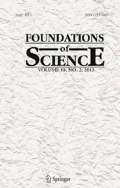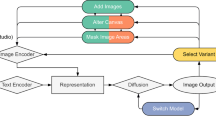Abstract
In recent controversies about Intelligent Design Creationism (IDC), the principle of methodological naturalism (MN) has played an important role. In this paper, an often neglected distinction is made between two different conceptions of MN, each with its respective rationale and with a different view on the proper role of MN in science. According to one popular conception, MN is a self-imposed or intrinsic limitation of science, which means that science is simply not equipped to deal with claims of the supernatural (Intrinsic MN or IMN). Alternatively, we will defend MN as a provisory and empirically grounded attitude of scientists, which is justified in virtue of the consistent success of naturalistic explanations and the lack of success of supernatural explanations in the history of science (Provisory MN or PMN). Science does have a bearing on supernatural hypotheses, and its verdict is uniformly negative. We will discuss five arguments that have been proposed in support of IMN: the argument from the definition of science, the argument from lawful regularity, the science stopper argument, the argument from procedural necessity, and the testability argument. We conclude that IMN, because of its philosophical flaws, proves to be an ill-advised strategy to counter the claims of IDC. Evolutionary scientists are on firmer ground if they discard supernatural explanations on purely evidential grounds, instead of ruling them out by philosophical fiat.
Similar content being viewed by others
References
Behe, M. J. (2006). Darwin’s black box: The biochemical challenge to evolution (10th Anniversary Edition). New York, NY: Simon and Schuster.
Benson H., Dusek J.A. et al (2006) Study of the therapeutic effects of intercessory prayer (STEP) in cardiac bypass patients: A multicenter randomized trial of uncertainty and certainty of receiving intercessory prayer. American Heart Journal 151(4): 934–942
Boudry, M. (2009). Methodological naturalism as an intrinsic property of science: Grist to the Mill of intelligent design theory. Paper presented at the conference “150 years after origin: Biological, historical and philosophical perspectives”, November 2009, Toronto.
Boudry, M., & Braeckman, J. (2010). Immunizing strategies & epistemic defense mechanisms. Philosophia, doi:10.1007/s11406-010-9254-9.
Coyne, J. (2009). Seeing and believing. The never-ending attempt to reconcile science and religion, and why it is doomed to fail. New Republic, February 4. Retrieved 30/03/2009 from http://www.tnr.com/article/books/seeing-and-believing?page=2.
Darwin, C. (1965 (1872)). The expression of the emotions in man and animals. Chicago, IL: University of Chicago Press.
Darwin, C. (1998 (1859)). The origin of species. Oxford: Oxford University Press.
Darwin C. (2000) The life and letters of Charles Darwin (Vol. 2). Adamant Media Corporation, Boston, MA
Dennett D. C. (1996) Darwin’s dangerous idea: Evolution and the meanings of life. Simon and Schuster, New York, NY
Dennett D. C. (2003) In Darwin’s wake, where am I?. In: Hodge J., Radick G. (eds) The Cambridge companion to Darwin. Cambridge University Press, Cambridge, pp 393–412
Edis T. (1998) Taking creationism seriously. Skeptic 6: 2–56
Edis T. (2002) The ghost in the universe: God in light of modern science. Prometheus Books, Amherst, NY
Edis T. (2006) Grand themes, narrow constituency. In: Young M., Edis T. (eds) Why intelligent design fails: A scientific critique of the new creationism. Rutgers University Press, New Brunswick, NJ, pp 9–19
Forrest B. (2000) Methodological naturalism and philosophical naturalism: Clarifying the connection. Philo 3(2): 7–29
Forrest B., Gross P. R. (2004) Creationism’s Trojan horse: The wedge of intelligent design. Oxford University Press, Oxford
Gish D. T. (1973) Evolution: The fossils say no!. Creation-Life Publishers, San Diego
Haldane J. B. S. (1934) Fact and faith. Watts, London
Haught J. F. (2000) God after Darwin: A theology of evolution. Westview Press, Boulder
Haught J. F. (2004) Darwin, design, and divine providence. In: Ruse M., Dembski W. A. (eds) Debating design: From Darwin to DNA. Cambridge University Press, Cambridge, pp 229–245
Hume, D. (2000 [1748]). An enquiry concerning human understanding. Oxford: Clarendon Press.
Hume, D. (2007 [1779]). Dialogues concerning natural religion and other writings. Cambridge: Cambridge University Press.
Humphrey N. (1996) Soul searching: Human nature and supernatural belief. Vintage, London
Johnson P. E. (1993) Darwin on trial (2nd ed). InterVarsity Press, Downers Grove, IL
Johnson P. E. (2001) Evolution as Dogma: The establishment of naturalism. In: Pennock R. T. (eds) Intelligent design creationism and its critics: Philosophical, theological, and scientific perspectives. MIT Press, Cambridge, MA, pp 59–76
Kitzmiller v. Dover (400 F. Supp. 2nd 707 (M.D. Pa.) 2005).
Kitcher P. (2007) Living with Darwin: Evolution, design, and the future of faith. Oxford University Press, Oxford, New York
Koperski J. (2008) Two bad ways to attack intelligent design and two good ones. Zygon 43(2): 433–449
Laudan L. (1996) The demise of the demarcation problem. In: Ruse M. (eds) But is it science? The philosophical question in the creation/evolution controversy. Prometheus Books, Amherst, NY, pp 337–350
Lem S. (1999) A perfect vacuum. Northwestern University Press, Evanston
Lewontin R. (1983) Introduction. In: Godfrey L. (eds) Scientists confront creationism. Norton, New York, pp xxiii–xxvi
Lewontin R. (1997) Billions and billions of demons. Book review of ‘The Demon-Haunted world: Science as a candle in the dark’ by Carl Sagan. The New York Review of Books 44(1): 31
Macbeth N. (1974) Darwin retried: An appeal to reason. Garnstone Press, London
Maienschein J. (2007) Untangling debates about science and religion. In: Comfort N. C. (eds) The panda’s black box: Opening up the intelligent design controversy. Johns Hopkins University Press, Baltimore, pp 83–108
McGinn C. (1994) The problem of philosophy. Philosophical Studies 76(2): 133–156
Miller K. B. (2009) The misguided attack on methodological naturalism. In: Schneiderman J. S., Allmon W. D. (eds) For the rock record: Geologists on intelligent design. University of California Press, Berkeley and Los Angeles, pp 117–140
Miller K. R. (2000) Finding Darwin’s God : A scientist’s search for common ground between God and evolution. HarperCollins, New York, NY
National Academy of Sciences: (1998) Teaching about evolution and the nature of science. National Academy Press, Washington DC
Nelson P. A. (1996) The role of theology in current evolutionary reasoning. [Article]. Biology & Philosophy 11(4): 493–517
Pennock R. T. (1999) Tower of Babel: The evidence against the new creationism. MIT Press, Cambridge, MA
Pennock R.T. (2007) God of the gaps: The argument from ignorance and the limits of methodological naturalism. In: Petto A.J., Godfrey L.R. (eds) Scientists Confront Intelligent Design and Creationism. New York & London, WW Norton & Company, pp 309–338
Pigliucci M. (2002) Denying evolution: Creationism, scientism, and the nature of science. Sinauer Associates, Sunderland, MA
Plantinga A. (2001) Methodological naturalism?. In: Pennock R. T. (eds) Intelligent design creationism and its critics: Philosophical, theological, and scientific perspectives. MIT Press, Cambridge, MA, pp 339–361
Richter R. (2002) What science can and cannot say: The problems with methodological naturalism. Reports of the National Center for Science Education 22(1–2): 18–22
Ruse M. (1982) Darwinism defended: A guide to the evolution controversies. Addison-Wesley, Reading, MA
Ruse M. (2004) The argument from design: A brief history. In: Dembski W. A., Ruse M. (eds) Debating design: From Darwin to DNA. Cambridge University Press, Cambridge, pp 13–31
Ruse M. (2005) Methodological naturalism under attack. South African Journal of Philosophy 24(1): 44–61
Ruse M. (2006) Darwinism and its discontents. Cambridge University Press, Cambridge
Sarkar S. (2007) Doubting Darwin? Creationist designs on evolution. Blackwell, Malden, MA
Schafersman, S. D. (1997). Naturalism is an essential part of science and critical inquiry. Retrieved 30/03/2009, from http://www.freeinquiry.com/naturalism.html.
Scott E. C. (1998) Two kinds of materialism: Keeping them separate makes faith and science compatible. Free Inquiry 18: 20–20
Scott E. C. (1999) The ‘Science and religion’ movement. An opportunity for improved public understanding of science?. Skeptical Inquirer 23(4): 29–31
Scott E. C. (2004) Evolution vs. creationism: An introduction. University of California Press, Berkeley, CA
Shanks N. (2004) God, the devil, and Darwin: A critique of intelligent design theory. Oxford University Press, Oxford
Smith K. C. (2001) Appealing to ignorance behind the cloak of ambiguity. In: Pennock R. T. (eds) Intelligent design creationism and its critics: Philosophical, theological, and scientific perspectives. MIT Press, Cambridge, MA, pp 705–735
Sober E. (2008) Evidence and evolution: The logic behind the science. Cambridge University Press, Cambridge
Stenger V. J. (2008) God: The failed hypotheis: How science shows that God does not exist. Prometheus Books, Amherst, NY
Strahler A. N. (1992) Understanding science: An introduction to concepts and issues. Prometheus Books, Buffalo
Swinburne R. (2004) The existence of God. Clarendon Press, Oxford
Worrall J. (2004) Science discredits religion. In: Peterson M. L., VanArragon R. J. (eds) Contemporary debates in philosophy of religion. Blackwell, Malden, MA, pp 59–71
Author information
Authors and Affiliations
Corresponding author
Rights and permissions
About this article
Cite this article
Boudry, M., Blancke, S. & Braeckman, J. How Not to Attack Intelligent Design Creationism: Philosophical Misconceptions About Methodological Naturalism. Found Sci 15, 227–244 (2010). https://doi.org/10.1007/s10699-010-9178-7
Published:
Issue Date:
DOI: https://doi.org/10.1007/s10699-010-9178-7




